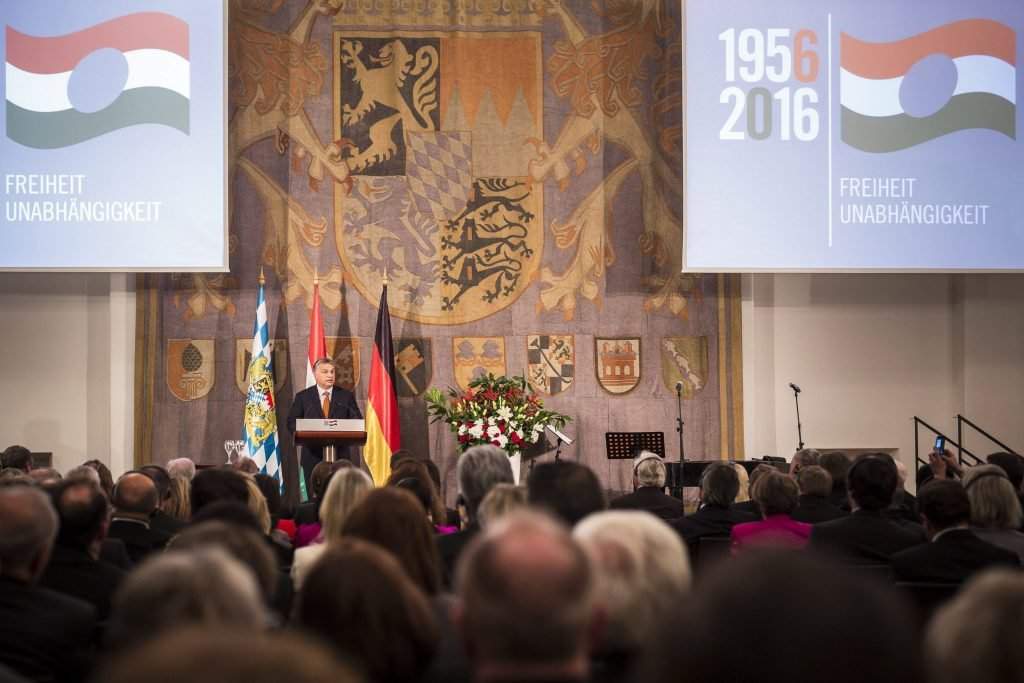Commemoration of the 1956 revolution in Munich

Munich (MTI) – The opening of the border in 1989 and the protection of the border today are two sides of the same coin, Prime Minister Viktor Orbán said in a speech on Monday in Munich at a commemoration of the 1956 revolution held in the Bavarian Landtag. “Then we acted for Europe’s freedom and today we are protecting it,” he said.
Bavarian-Hungarian friendship is special and unique in Europe, Orbán said. “This friendship forms a huge arc; we undertook bad things and good things in the course of history, but now we are progressing on the right track because we have undertaken a joint goal of creating a secure, free, peaceful and blossoming Europe,” the prime minister said. “This aim is a cause for pride and is worthy of the legacy of the 1956 freedom-fight,” he added.
Orbán said that by virtue of its geographic position, Hungary is thrust into the “mainstream” of “European battles” once every thirty years. “This is how it was in 1956, in 1989 and in 2015-16 when we had to seal the border to stop the migration wave from the south.” He said Hungary had never “asked” for these “tasks”, but they were rather placed before the country “by fate”. “Hungarians never ran away, never backed down; they fulfilled their duty,” the prime minister said. Orbán said Hungary will cope with its tasks even if it is “being attacked from behind by those whom we are protecting”.

Orbán said his own generation had always dreamed of reuniting Europe so that their children could live in a free world and enjoy a higher standard of living. Hungarians had also dreamed the “European dream” of peace, security and prosperity, which was why Hungary joining the EU was a natural step, he said.
Today Bavaria and central Europe make up one of the strongest regions in the world, Orbán said. And it is their joint responsibility to develop and prosper as “Europe’s engine of growth” for the good of the European Union as a whole, he added.
He said the only way freedom could have any meaning was if “we put aside our petty goals, overcome our fears and take action”. To do this, one must have courage, Orbán said. Europe now faces a situation in which “we cannot cowardly look away”. The EU is in trouble, he insisted, adding that the bloc faces nothing but unresolved problems, unanswered questions and disputes. But there are no common answers to these, he said.
The prime minister said the EU could not expect others to resolve its problems, insisting that Europe must take control of its own fate. Changes are needed “if we are to preserve Europe and the European dream,” Orban said. The only question is whether Europe has the “courage” to enact “meaningful changes”, he added.
He said reforms were not enough to change Europe. Europe must renew itself and the changes must come from within, Orbán said. “We cannot allow European unity, for which we have sacrificed so much,” to fall apart due to “ideological” reasons, “financial interests” or bad decisions by politicians, he said.
He noted that after the Soviet intervention in the 1956 revolution, 60,000 people had gathered for a march in Munich to silently commemorate the Hungarians who had fallen in their struggle for freedom. Once the “brutal Soviet communist retaliation” had crushed every form of resistance, many Hungarians emigrated to the west where they were helped by the Bavarians, Orbán said. The Hungarian refugees waited patiently for the authorities to rule on their admissions, he noted. Many Hungarians were taken in and went on to become law-abiding and hard-working German citizens in Christian Bavaria, the prime minister added.
Hungary is a one thousand-year-old Christian state that has always been “the land of freedom fighters” that does not tolerate oppression, invasion or dictatorship, Orbán said. Hungary will always be “on the side of European freedom” in the future, too, he insisted.
He said that the military intervention by the communist regime in the 1956 revolution was a “defeat” for all of Europe. Europe can only be free and strong if it is united, Orbán said, arguing that it was this approach that had led to the idea of the European Union.
Orbán said the reunification of Germany had made the EU a world power. Germany supported the central European countries which were then able to join the EU, ushering in the heyday of the bloc, Orbán said.
Photo: MTI
Source: MTI





